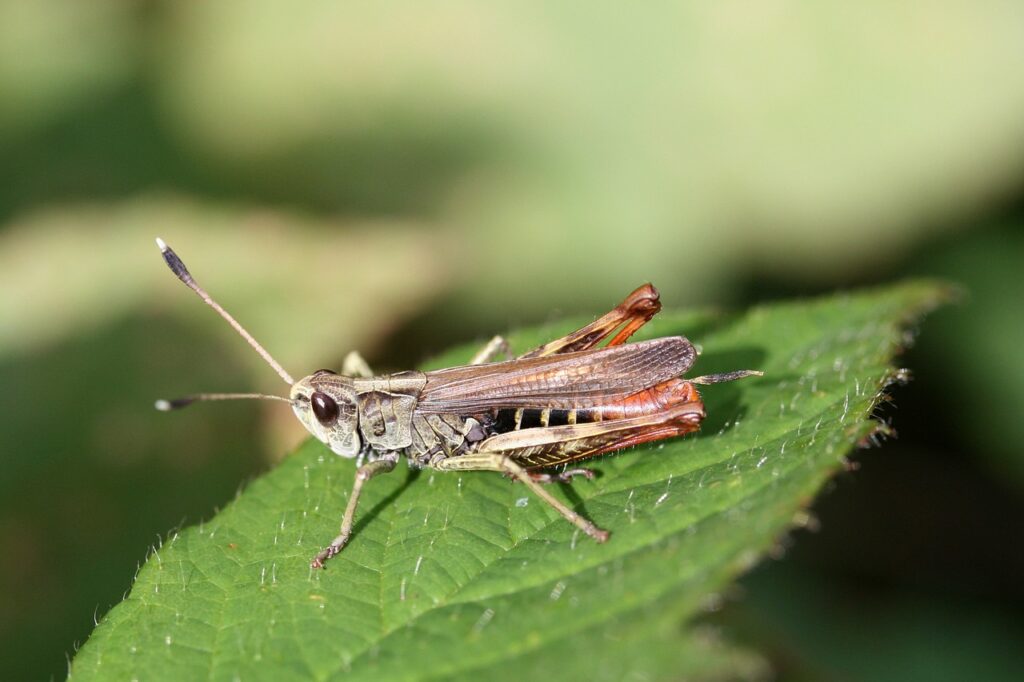Crickets might be a great reminder that the summer is at its peak, but these loud insects are nothing but trouble when they inhabit homes.
While there are over 900 cricket species, some of them developed a particular taste in human homes. They might be completely content in the field during the summer, but need additional shelter and food during the winter months, and unfortunately, our homes are the perfect locations.
So, if loud cricket chirping is keeping you awake at night, and you worry about the additional health risks, keep on reading to find the best ways to get rid of crickets once and for all.

What Are House Crickets?
Crickets come in different shapes and sizes, but the most common species that you can encounter in your home is the Acheta Domesticus (Linnaeus) or house cricket. They have strong jumping legs like all other crickets, but smaller bodies between about 3/4 to 7/8 inch in length.
The loud chirping sound is produced by male crickets in an effort to attract females and quickly reproduce while the conditions are favorable. Cricket mating can produce over 400 eggs from a single female in a year, so the infestation can quickly become severe if not controlled.
You can identify the cricket infestation if you notice a few signs such as:
- Multiple adult crickets (a few of them is usually not a cause for alarm)
- Famous loud chirping, especially during the night
- Damage on your clothes, papers, and furniture (make sure it’s not from moths)
Crickets might not be dangerous like termites, but when they are hungry and in large numbers they will become quite the nuance. Loud chirping during the night, damage to your belongings, and even diseases and pathogens they can transmit are not to be taken lightly.
In addition, crickets in your garden and your home will attract other pests that feed on them such as spiders and raccoons, so it’s a good idea to go over our list of potential remedies, and even contact the local exterminators for additional help. It’s always better to deal with the pests while the numbers are low and they are not causing too much damage to your property and valuable items.

How to Get Rid of Crickets?
Now that we are familiar with crickets, their habits, and most of all the danger they represent to your health and valuable items, it’s time to find the best solutions to get rid of them. Keep in mind that during the summer it’s normal to see a few crickets lost in your home, but if their numbers are growing make sure to act immediately before they make your home theirs.
Here are a couple of suggestions to try:
Glue Cricket Traps
One of the easiest and most efficient ways to deal with a smaller cricket infestation in your home is to use glue traps. These durable and strong adhesive papers will catch any pests that lurk around your home, and considering they are laced with additional scents to attract the crickets you don’t have to use any separate lures.
When choosing the best glue trap for crickets in your home make sure it’s non-toxic and poison-free as you can place it in high-traffic areas for up to one year.
Diatomaceous Earth Powder
Diatomaceous Earth is a natural powder that can help you with various pests including crickets, roaches, silverfish, bed bugs, and more. This unique powder dries out the exoskeleton of insects dehydrating them to death. This way you can deal with entire cricket colonies while using eco-friendly and safe solutions.
Keep in mind that it’s best to use Diatomaceous Earth powder with a duster that has a long nozzle attachment. This way you can apply the powder to all the nooks and crannies the bugs might hide in, and make the entire process less messy.
Cricket Killer Sprays
For larger cricket infestations and prolonged protection of your home and yard, it’s best to use killer sprays. The odorless and residue-free formula will kill all the pests in your home and garden, and leave a protective layer that will repel other insects from entering again.

Cricket Yard Granules
For additional protection against crickets and other insects in your yard, it’s a good idea to choose granulated insect baits. The main ingredient in the granules is Boric Acid known to be efficient on crickets, ants, roaches, snails, slugs, and other pests that might find your yard and later your home the perfect breeding ground.
When dealing with any kind of pests, but crickets, in particular, it’s always the best approach to protect the entire house including your yard from the start. Most of the crickets will come from your yard to your home in search of shelter and food, so it’s very important to deal with the infestation before it becomes severe.
Call Professional Exterminators
If the cricket infestation is severe, and the damage they cause on your valuable papers, furniture, clothes, and plants is substantial it’s time to call professional exterminators. While most people are able to deal with a few crickets that come into the house on accident, and minor infestations can be eliminated with the tools, tips, and tricks mentioned above, if the situation is getting out of control it’s a good call to hire professionals.
Pest control teams in your area know how to deal with various pests, and have the experience and the knowledge, but overall they have the best and most efficient tools and chemicals. The best way to deal with any pest infestation is to act immediately, and rely on pest control if you are not able to manage the infestation on your own.
So, even though a few crickets in the garden can remind you of warm summer weather, make sure they don’t find permanent shelter in your home.